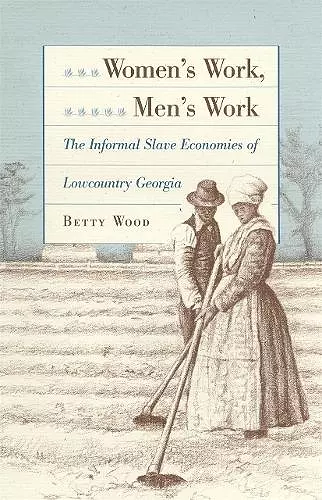Women's Work, Men's Work
The Informal Slave Economies of Lowcountry Georgia
Format:Hardback
Publisher:University of Georgia Press
Published:1st Feb '95
Currently unavailable, and unfortunately no date known when it will be back

In Women's Work, Men's Work, Betty Wood examines the struggle of bondpeople to secure and retain for themselves recognized rights as producers and consumers in the context of the brutal, formal slave economy sanctified by law. Wood examines this struggle in the Georgia lowcountry over a period of eighty years, from the 1750s to the 1830s, when, she argues, the evolution of the system of informal slave economies had reached the point that it would henceforth dominate Savannah's political agenda until the Civil War and emancipation.
The daily battles of bondpeople to secure rights as producers and consumers reflected and reinforced the integrity of the private lives they were determined to fashion for themselves, Wood posits. Their families formed the essential base upon which, and for which, they organized their informal economies. An expanding market in Savannah provided opportunities for them to negotiate terms for the sale of their labor and produce, and for them to purchase the goods and services they sought.
In considering the quasi-autonomous economic activities of bondpeople, Wood outlines the equally significant, but quite different, roles of bondwomen and bondmen in organizing these economies. She also analyzes the influence of evangelical Protestant Christianity on bondpeople, and the effects of the fusion of religious and economic morality on their circumstances.
For a combination of practical and religious reasons, Wood finds, informal slave economies, with their impact on whites, became the single most important issue in Savannah politics. She contends that, by the 1820s, bondpeople were instrumental in defining the political agenda of a divided city—a significant, if unintentional, achievement.
Draws upon and makes the most of the available evidence, notably slave narratives, plantation records, municipal archives, and newspapers. And it presents its case in a clearly written, exceedingly well-organized combination of argument, evidence, and informed speculation.
Carefully researched and fully documented . . . Wood is an able scholar whose study Slavery in Colonial Georgia, 1730–1775 made a valuable contribution that is now extended with this thoughtful examination of slave life.
In recent years there has been a shift to investigating the 'internal' or 'informal' economy in which slaves bought, sold, or bartered their own goods. . . . Women's Work, Men's Work is a major and superb addition to these studies.
Presents a perspective of slave life that up to this point has received little attention.
Clearly written and well-crafted . . . Superbly reconstructs the informal slave economies of lowcountry Georgia. Hers is a convincing portrait that fills an important gap in our knowledge of bondspeoples' lives.
The thousands of bondpersons who people Betty Wood's brilliant study labored long and hard on small parcels of land in their desire to achieve a small degree of quasi independence and better their material condition of life. . . . Provides a worthy model for specialists in other parts of the South to follow.
Solidly grounded in studies of slave societies in the Caribbean as well as the American South.
ISBN: 9780820316673
Dimensions: 229mm x 152mm x 27mm
Weight: 621g
264 pages